6 Surprising Results From Circumcision Survey Data
All Aella survey results related to circumcision.
The sexuality researcher Aella, whose work was recently featured on the Lex Friedman Podcast, has been using her online platform to accumulate data and meticulously tracking her survey results for years.
She was kind enough to share the full data from her surveys with me. As someone who has been researching the issue of circumcision for years, I wanted to know what her data revealed about the issue of male genital cutting.
Here are six interesting takeaways from her survey data:
1. Most Men Know If They Are Circumcised
Before getting into the most interesting data, let’s look at who responds to Aella’s surveys. Aella’s respondents might be more sexually aware than the general public since they follow a sex researcher. Her survey data indicates that the majority of respondents (94.7%) know if they are circumcised or not:
This is important because a significant amount of search data for the word “circumcision” and questions about this topic on online forums include inquiries like “Am I circumcised?” or “How can I tell if I’m circumcised?” In the opening of my film American Circumcision, an older man asks an activist what circumcision is and is unaware that it removes tissue.
Simply knowing what circumcision is makes her respondents more aware than some of the public. However, even among the audience of a sex researcher are some respondents (2.9%) who do not even know if a portion of their genitals has been surgically removed.
This data is also relevant because one of the justifications given by defenders of circumcision is that men will not know what they are missing. This survey data indicates that men are overwhelmingly aware of their bodies and whether or not they have been circumcised.
Around 80% of American men are circumcised,1 and globally around 30% of men are circumcised.2 Survey data of Aella’s audience indicates a roughly 52.% circumcision rate based on over 5000 respondents.
The circumcision rate of respondents rests at a median between the American and international circumcision rates. This indicates that survey respondents likely have a variety of backgrounds that include both American and international respondents and circumcised and intact men.
2. Circumcised Men Are Divided, But Intact Men Agree Foreskin Is Better
In online surveys, circumcised men are divided on whether or not they would prefer to be circumcised or intact, but the majority of who still have their foreskin are prefer what they have and would keep their body intact even if given the option to be circumcised.
A 2019 online survey of 2,694 men asking if they could painlessly transform their penis from what they have to the other mode found that 43.1% of circumcised men would get their foreskin back if they could, while the overwhelming majority of intact men (83.8%) would keep what they have.
Given that intact men have the option to get circumcised, while circumcised men do not yet have the ability to regrow their foreskin, this survey suggests that the reason these intact men do not “transform” to “the other mode” is the pain of circumcision, since the question specifically qualifies that this change would be “painless.”
When the same question was repeated to a larger audience of 3,325 men in 2021, preference for the intact body increased. Intact men were less likely to want to be circumcised and circumcised men were more likely to want to be intact.
This suggests that between 2019 and 2021, awareness of the value of the foreskin increased among both groups of men and indicates that some cultural change has occurred around the issue of circumcision, at least among the survey audience.
3. Most Circumcised Men Would Not Circumcise Their Own Child
The division circumcised men experience around whether or not they would prefer to be circumcised extends to their children.
An online survey asking “Are you circumcised? | If you had a male child, would you get him circumcised?” found that the majority of circumcised men would not circumcise their own child (56.5%), while intact men overwhelmingly would keep their child intact (90.3%).
A small minority of intact men said they would circumcise, mirroring the small minority of intact men who would prefer circumcision in previous survey questions. While circumcised men were more likely to circumcise their own child, the amount that would not is even greater than the number of men who would choose to get their foreskin back if given a painless option to do so.
4. People Prefer Intact Partners According To Sexuality Survey Data
A survey asking “do you prefer having sex with circumcised or uncircumcised men?” showed that the majority preferred intact men (57.1%).
While there were 1,788 responses, a significant portion were removed since respondents said they did not have sex with men. The resulting data shows a strong preference for the intact body among male-attracted respondents.
A survey asking what type of penis respondents preferred giving handjobs to included an option for whether or not respondents have tried both. Survey results show that nearly a third of respondents (28.1%) had no comparative experience, while those that had preferred intact pensises (46.9%).
If we removed results for those who have not “tried both” the divide increases, with 65.1% of respondents who had experience with both intact and circumcised men preferring to give handjobs to intact men.
Filtering out those without comparative experience between intact and circumcised men shows a nearly 15% increase from 51.7% to 65.1 in the preference for the male body. While this change could also be attributed to the difference between asking about sex with different men versus specifically handjobs, the difference is more likely attributed to comparative experience, since only one survey question includes an option for not knowing due to lack of experience.
5. Survey Data Shows Majority Support Banning Infant Circumcision
Support for circumcision changes based on the way the question is phrased or framed.
When the question is simply , the majority support keeping it legal (60.5%). However, when the question specifies circumcision of minors, the majority support banning infant circumcision, by nearly the same percentage (62.5%).
This suggests that the way the question is framed is important. If the discussion over circumcision specifies infant circumcision, support for legislation against circumcision dramatically increases.
Interestingly, only a small minority (11.7%) support banning circumcision for one gender, but not another. Given cultural attitudes, it seems likely the majority in this category support a ban on female genital cutting, not male, but the question does not specify, so either is possible in this category.
Survey data shows that most respondents support allowing adults to make their own decisions about their body regarding circumcision, but believe it should be illegal to force circumcision on a non-consenting minor.
Surveys asking if infant circumcision was unethical received a similar response to asking if infant circumcision should be banned, with only a 0.1% percentage point difference between asking if infant circumcision was ethical (62.6% said no) and asking if it should be banned (62.5% said yes).
This shows a strong correlation between the belief that infant circumcision is unethical and believing that there should be a law prohibiting it.
The highest response against genital cutting came when the question was “Do you believe any medically unnecessary surgery on the genitals of an infant should be illegal?” with 74.1% of respondents saying yes.
It is worth noting that this phrasing would include practices other than male infant circumcision, such as female genital cutting and intersex genital cutting. Many laws and arguments against gender transition surgeries on minors also use similar language. However, this survey data shows that when all unnecessary genital surgeries on infants are included, support increases.
This question also includes the qualifier that the question is referring to “unnecessary surgeries.” The inclusion of this qualifier might also be responsible for increased support. The question does not explicitly mention circumcision and instead focuses respondents’ attention on the fact these surgeries are unnecessary, rather than any pre-existing cultural biases they might have around circumcision.
This framing allows some respondents to have different ideas about what constitutes a “necessary” or “unnecessary” surgery. For example, some respondents might see childhood gender transition surgeries as acceptable under the language of this ban, while others might not. While there might be debate over what constitutes a “necessary” or “unnecessary” surgery, it is worth noting that the majority supports banning unnecessary surgeries on minors, even if they might have differing ideas about what constitutes an unnecessary one.
6. Men Do Not Want To Experience Circumcision
In response to a survey asking “If you could press a magic button that would allow you to remember your circumcision, would you?” men overwhelmingly said no (92.3%).
This is not surprising, given that circumcision is painful. Although research shows that infant circumcision causes a lasting change in behavior that researchers have attributed to a form of memory or PTSD3 and some men report recovering feelings or memories associated with circumcision, most would not want to consciously remember the experience.
Related Bonus Data: People Care A Lot About Their Genitals
While this data does not directly relate to circumcision, it does have implications for the issue.
One survey asked “One button kills a random person somewhere in the world; they just fall over dead. The other button swaps your genitals and reproductive organs to that of the opposite sex (tho everything else about you remains the same) You have to press one; you'd rather” and then gave respondents the option to “kill a random person” or “swap your genitals.” Most respondents said they would rather “kill a random person” (57%) than have their genitals swapped (43%).
Given that the majority of respondents would rather “kill a random person” than have someone significantly alter their genitals, it is worth questioning any practice that alters the genitals.
When asked “Would you rather lose 50% of your teeth or 50% of your genitals, assuming no replacements?” respondents said they would prefer to lose half their teeth (57%).
Given that circumcision removes a comparable portion of the shaft skin of the penis, one could argue that this survey shows that most would rather get their teeth kicked in than experience the results of circumcision.
If you liked this article, please subscribe and check out my previous article exploring what one survey shows about the potential market for foreskin regeneration:
Survey Data Shows The Foreskin Regeneration Market Is Over 200 Billion Dollars
An online survey of over 10,000 circumcised men shows that the market for men willing to pay to regrow their foreskin is over 200 billion dollars in the United States and potentially between half a trillion and 2.5 trillion dollars worldwide. Survey Results
Products - Health E Stats - Trends in Circumcision Among Male Newborns Born in U.S. Hospitals: 1979–2010. www.cdc.gov/nchs/data/hestat/circumcision_2013/Circumcision_2013.htm.
World Population Review. “Circumcision by Country 2023.” World Population Review, worldpopulationreview.com/country-rankings/circumcision-by-country.
Taddio A, McMurtry CM, Shah V, Riddell RP, Chambers CT, Noel M, MacDonald NE, Rogers J, Bucci LM, Mousmanis P, Lang E, Halperin SA, Bowles S, Halpert C, Ipp M, Asmundson GJG, Rieder MJ, Robson K, Uleryk E, Antony MM, Dubey V, Hanrahan A, Lockett D, Scott J, Bleeker EV; HELPinKids&Adults. Reducing pain during vaccine injections: clinical practice guideline. CMAJ. 2015 Sep 22;187(13):975-982. doi: 10.1503/cmaj.150391. Epub 2015 Aug 24. PMID: 26303247; PMCID: PMC4577344.



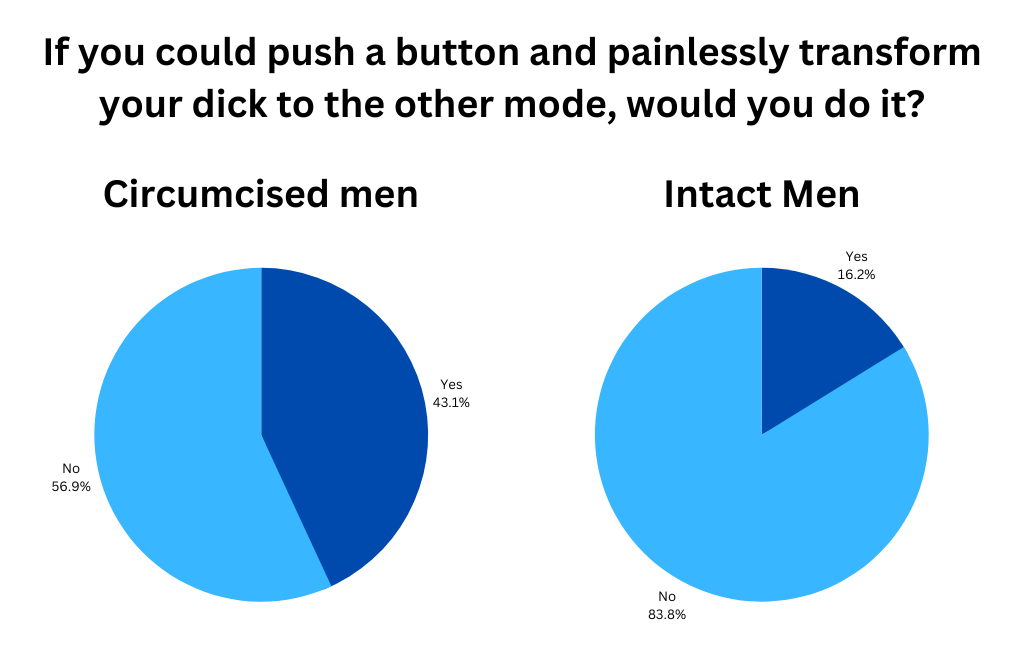




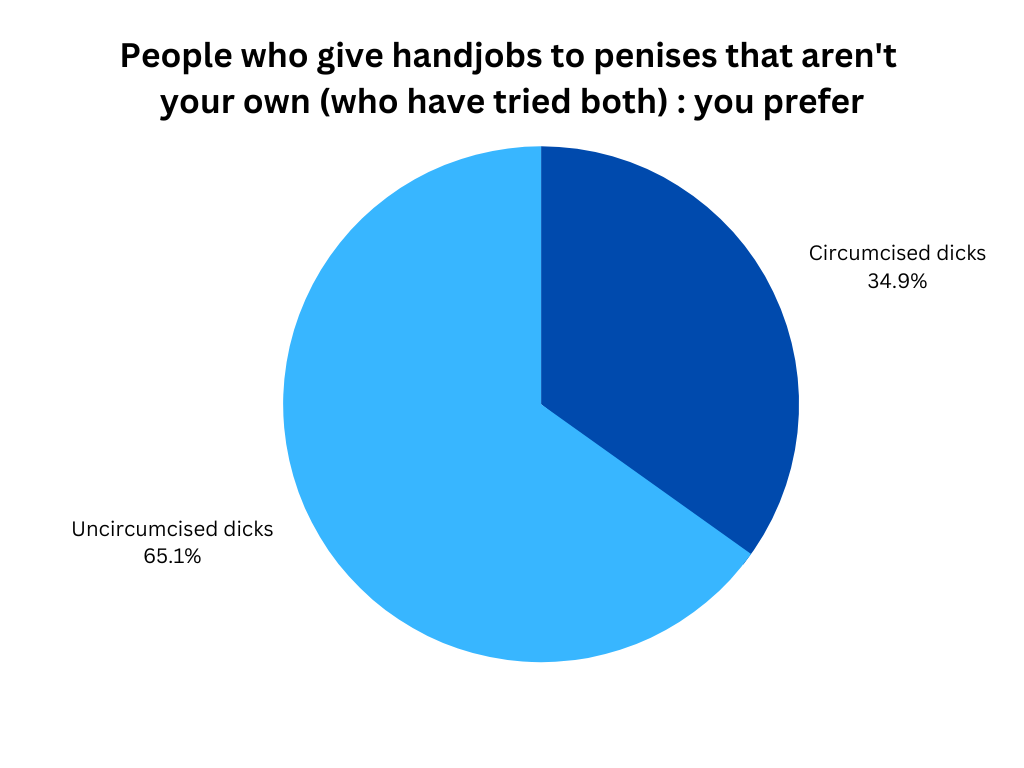
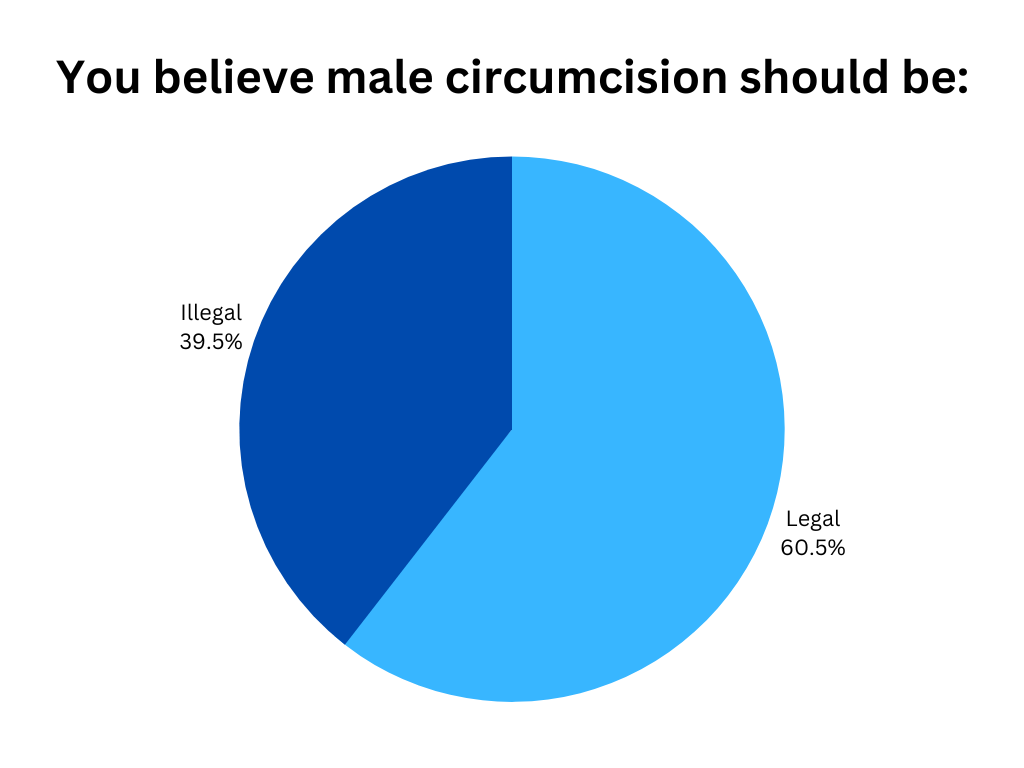



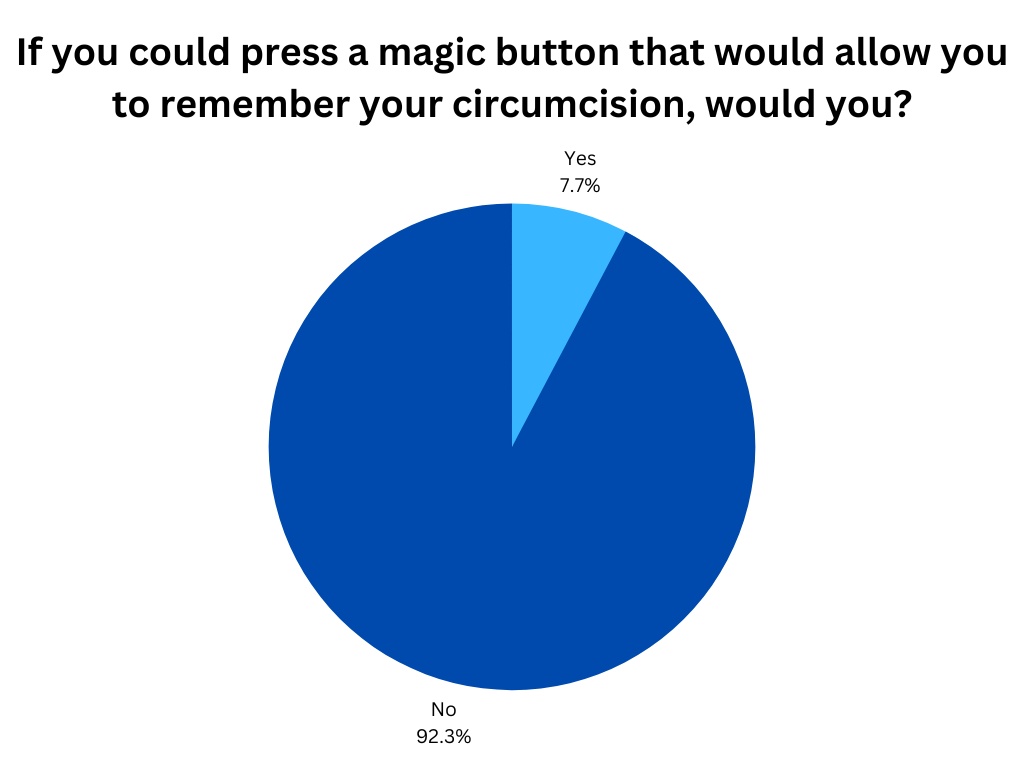

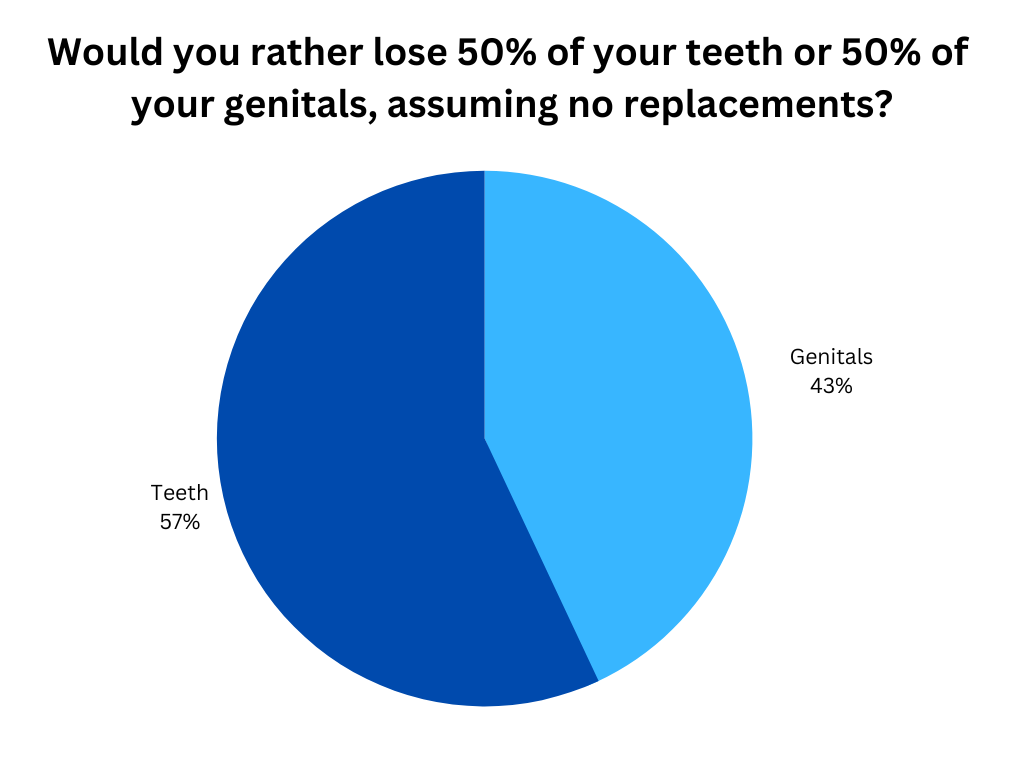

Thank you for what you do! I'm looking forward to Foregen regeneration.
As for your link to the dreams and nightmares about circumcision.
I've done extensive, super deep dream journaling, and have experience with multiple modes of psychotherapy, somatic experiencing, etc.
Yep, it's all real.
Nightmares of being immobilized and choked out by antagonistic demonic like figures, and blacking out. Many have reported the same.
I look forward to Foregen.
Thank you, Brendon!
Given my experiences online, I would venture that the majority of “intact” men stating they wish they were circumcised and would circumcise their sons are actually circumfetishists trying to push their agenda on unwitting future parents.